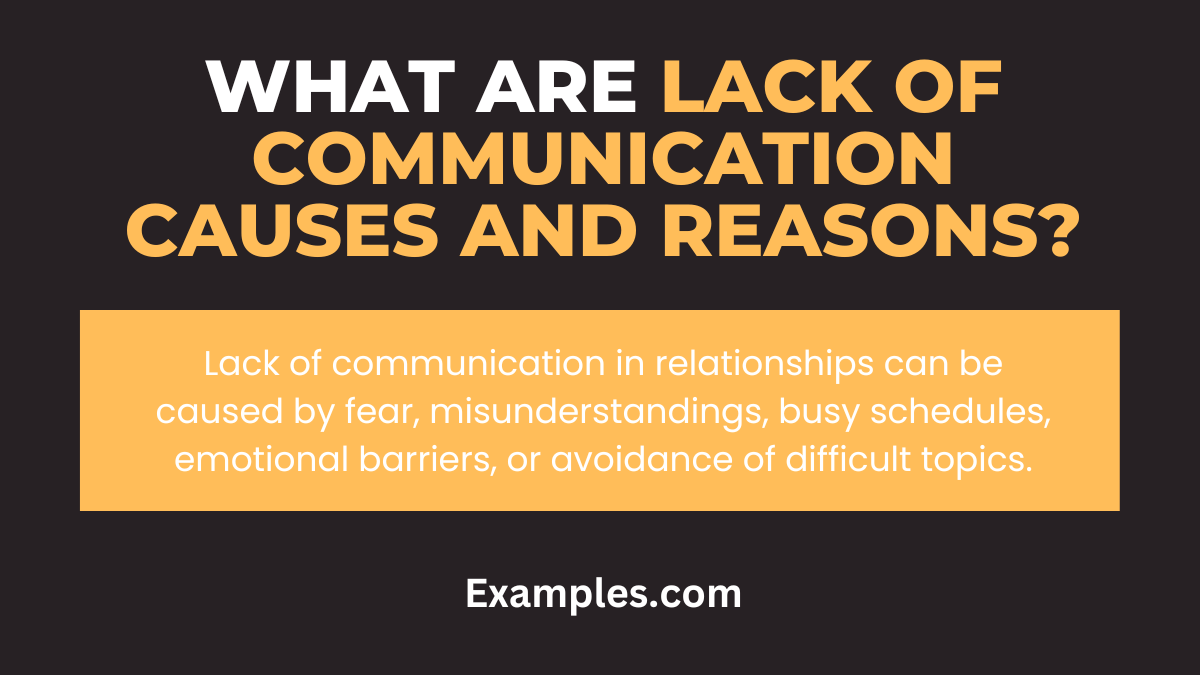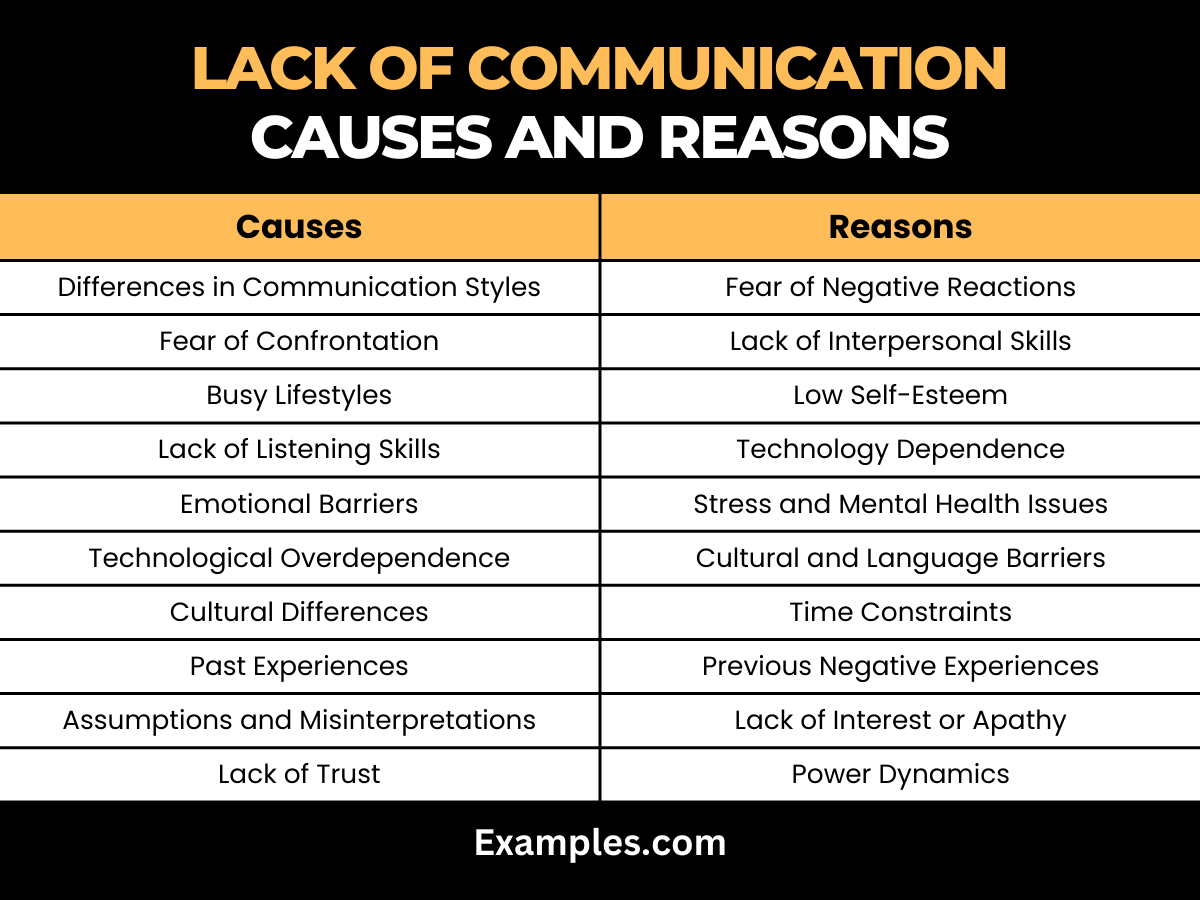20 Lack of Communication Causes and Reasons Examples
What are Lack of Communication Causes and Reasons?

Lack of communication refers to the insufficient or ineffective exchange of information, thoughts, or feelings between individuals or groups. This can lead to misunderstandings, conflicts, and a breakdown in relationships, whether personal or professional. The causes and reasons for this lack of communication are diverse and can vary depending on the context and the individuals involved. Key factors include differences in communication styles, fear of negative reactions, lack of interpersonal skills, overreliance on digital communication, and cultural or language barriers. Other significant reasons might be busy lifestyles, emotional barriers like low self-esteem or stress, past negative experiences, and even power dynamics in certain relationships. Recognizing and addressing these causes is essential for improving communication and fostering healthier, more effective interactions.
Lack of Communication Causes and Reasons

Causes of Lack of Communication
1. Differences in Communication Styles
Individuals have unique ways of communicating. Some prefer direct communication, while others might be more subtle. These differences can lead to misunderstandings if not acknowledged and accommodated.
2. Fear of Confrontation
Many people avoid communication because they fear conflict or confrontation. This can stem from past negative experiences or a lack of confidence in handling difficult conversations.
3. Busy Lifestyles
In today’s fast-paced world, busy schedules and constant distractions can significantly hinder effective communication. People often find it challenging to find time to sit down and have meaningful conversations.
4. Lack of Listening Skills
Effective communication is not just about speaking; it’s equally about listening. Poor listening skills can lead to misunderstandings and a feeling of being undervalued or not heard.
5. Emotional Barriers
Emotions like anger, sadness, or jealousy can act as barriers to open communication. These feelings can prevent individuals from expressing themselves clearly and understanding others.
6. Technological Overdependence
Overreliance on digital communication methods like texting and emailing can lead to a lack of deeper, face-to-face conversations, which are essential for building stronger connections.
7. Cultural Differences
Cultural backgrounds influence communication styles. Misunderstandings can arise when cultural nuances in communication are not understood or respected.
8. Past Experiences
Previous negative experiences in communication can lead to reluctance in opening up in future interactions. This can create a cycle of poor communication habits.
9. Assumptions and Misinterpretations
Assuming what the other person means without seeking clarification can lead to misinterpretations and a breakdown in communication.
10. Lack of Trust
Trust is fundamental to open communication. A lack of trust can stem from past betrayals or inconsistencies and can lead to withholding information or feelings.
Reasons for Lack of Communication
1. Fear of Negative Reactions
Many individuals avoid communication due to fear of anger, disappointment, or disapproval from the other party. This fear can stem from previous adverse reactions to honest conversations.
2. Lack of Interpersonal Skills
Some people may not have developed effective interpersonal skills, such as expressing thoughts clearly or understanding non-verbal cues, leading to difficulties in initiating or maintaining communication.
3. Low Self-Esteem
Low self-esteem can make individuals doubt the value of their opinions or hesitate to express their needs and feelings, thus hindering open communication.
4. Technology Dependence
Excessive reliance on electronic communication can impede the development of face-to-face communication skills. Texts and emails often fail to convey tone and emotions adequately, leading to misunderstandings.
5. Stress and Mental Health Issues
Stress, anxiety, and depression can greatly affect a person’s ability to communicate effectively. Mental health issues might make it hard for individuals to articulate their thoughts and feelings.
6. Cultural and Language Barriers
Cultural differences and language barriers can significantly impact communication. Misunderstandings can arise when people are not familiar with each other’s cultural norms or language nuances.
7. Time Constraints
In a fast-paced environment, finding time for meaningful conversations can be challenging. This lack of time can lead to superficial or incomplete communication.
8. Previous Negative Experiences
Past experiences, such as being misunderstood, judged, or ignored, can make individuals reluctant to engage in open communication in the future.
9. Lack of Interest or Apathy
Sometimes, a sheer lack of interest in the topic or the conversation partner can lead to poor communication. This apathy prevents engaging in meaningful dialogue.
10. Power Dynamics
In some cases, power imbalances, whether in personal relationships or the workplace, can inhibit open and honest communication, with one party feeling overpowered or intimidated.
Tips to Improve Communication
- Practice Active Listening: Pay attention to what others are saying without formulating a response while they are speaking.
- Express Clearly: Use simple and clear language to convey your message. Avoid jargon and complex terms.
- Understand Non-Verbal Cues: Pay attention to body language, facial expressions, and tone of voice.
- Empathize: Try to understand the emotions and perspectives of others.
- Ask Questions: Clarify doubts and show your interest in the conversation.
- Provide Feedback: Constructive feedback helps others understand how they are perceived.
- Be Open and Honest: Share your thoughts and feelings openly but respectfully.
- Practice Makes Perfect: Regularly engage in conversations to improve your communication skills.
- Mind the Medium: Choose the appropriate channel for your message, whether it’s in person, over the phone, or in writing.
- Resolve Conflicts: Address misunderstandings or disagreements promptly and calmly.
Lack of Communication Causes and Reasons in the Workplace
- Hierarchical Barriers: Organizational structures creating gaps in communication.
- Inadequate Training: Lack of training in effective communication techniques.
- Unclear Roles and Responsibilities: Ambiguity in roles leading to confusion and poor communication.
- Workplace Culture: A culture that does not encourage open dialogue.
- Technological Issues: Inefficient use of communication tools in the workplace.
- Information Overload: Too much information leading to important details being missed or misunderstood.
- Physical Work Environment: Layouts that hinder interaction and communication.
- Personal Conflicts: Interpersonal issues affecting professional communication.
Tips to Improve Workplace Communication
- Promote Open Dialogue: Encourage an environment where all voices are heard and valued.
- Regular Team Meetings: Conduct consistent meetings to share updates and feedback.
- Effective Use of Technology: Utilize communication tools appropriately to enhance, not hinder, interaction.
- Clarity in Roles: Ensure everyone understands their responsibilities and the communication channels.
- Active Listening: Foster a culture where listening is as important as speaking.
- Feedback Mechanisms: Implement systems for providing constructive feedback.
- Training Programs: Provide training in communication skills and team-building.
- Conflict Resolution Strategies: Develop clear strategies for resolving interpersonal conflicts effectively.
Understanding the causes and reasons for lack of communication is essential in addressing and improving interpersonal interactions. Whether it’s in personal relationships, like Lack of Communication in a Relationship, or professional settings, recognizing these factors enables us to develop strategies for more effective and meaningful communication. Acknowledging and actively working on these aspects can significantly enhance the quality of our interactions and relationships.



